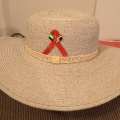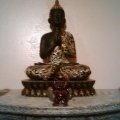Thoughts on witnessing
 Jeroen
Not all those who wander are lostNetherlands Veteran
Jeroen
Not all those who wander are lostNetherlands Veteran
It seems to me that being a witness and seeing the space between things are closely intertwined. As soon you start looking at thoughts and energy you end up noticing the space around them, a quality of spaciousness that you take as naturally as a fish takes the ocean around it. It’s quite lovely and loveable.
Another area of witnessing which seemed to become clear recently is that in order to witness properly you have to be dispassionate, otherwise your own mental reactions to your thoughts cause you to go into a tailspin. This happens especially if you are in the habit of judging yourself. Being dis-passionate is difficult, after a lifetime of following the passions. It’s a step that mindfulness naturally leads you to, when you take a first step back from your thoughts and feelings into observing them, you enter a new realm of reactivity, a new place where responses get a place to play.
I would call this intermediate mindfulness, letting go of the passions and becoming dispassionate and more calm. I’ve found this a difficult process because as you drift in and out of different states of consciousness, deeply ingrained desires tend to come to the surface more and reestablish themselves. It is only with a fairly clear and concentrated mind that I can let go of the passions, and even then it is a question of to what extent you can stay relaxed…





Comments
Jeroen
sorry if this is too long but I though it was required.
I very much appreciate your observations. I see your experience as a connection with the process of becoming more mindful in seeking to still the mind in that it also leads one also being more aware of the chattering thoughts and desires of ones imaginations, as well as being aware of self-judgments that occur, which I attribute to the self and self-identity.
I don’t see this in-between, this intermediate state between peace and chaos as something that can be helped. I also believe that it is necessary if one is to find a more enduring peace. If we simply try to quiet the mind and ignore our thoughts we miss the opportunity to speed up the process of our salvation from them as I have found they have a cause that can be undone with mindfulness, and, right thinking. I say speed up the process because one way or another one must work through to undo the cause of that duality of the mind if one is to find inner peace.
There are several things to consider for undoing, much of which is wrong thinking and wrong perception. Examples:
Actually, each of these is the same thing, including vanity and the self-imagery that forms self-esteem. And, as you might guess, all are about self-love, or, in this case, loving an imaginary self. Each of these things is also completely imaginary. We think to love and imaginary self formed in the imagination according to conditions and conditional judgments. This means that we never love ourselves, but ever fail to love ourselves. An illusory self is no one to accept and love. That self does not exist. And yet consider the power of ego where every need of ego that compels you is about feeding a self that does not exit.
Ask yourself “What am I”, and there are only two answers available for your perception, the Mind, and illusions. All your answers for ego, no matter how many illusions you that you might have are still only one thing, and that is illusion. The truth is that you are Mind; you are not the ego because the ego is no one, nor are you even the body, because the body is no one.
Everything of duality is a war between the Mind and the vain imaginations of the heart. All the chatter and the self-judgment is to form illusions of self-imagery and to judge if we are enough and worthy of love.
The activation of the imagination to satisfy our need for self-love with illusions is to set free a heard of wild horses that cannot be tamed. and they are not for you to try to tame, only undo the cause.
If you are aware enough you may notice that much of your time in your head is spent forming images of you and trying to control other imaginations, especially the emotional ones. There are two things to understand. If you try to love yourself you shall ever and always fail. If you would love yourself then learn to stop trying. Also akin to this is another precept, and that is that _it is not for you to try to satisfy the mind, but for the Mind to satisfy you.
What we do wrong is we chose ego over Love. While in choosing Love we choose to trust in our Mind to provide Love for us, as the Mind is the Source of Love, the choice for ego is to trust and call upon our vain imaginations to provide for us delusion, even though we think to call upon the imagination to bring us Love. Not knowing we mistake delusion for self-love.
My thesis on the matter is this: Everything is a choice between abiding in Love and abiding in ego, which is the choice to have faith in your Mind to indeed bring you Love that would sustain you, or, to faith in your imaginations to form illusions to love and bring you empty delusion for which you continue to crave.
You already know, I am sure, that when you enter into your right Mind there is peace and your imaginations grow quite for a time, because at that moment nether are you craving illusions to satisfy you.
As to the dispassionate awareness of your vain thoughts that is when you can deny them for the vanities they are. That is when in denying them you come to a greater faith in your Mind since you are denying the illusions that are unfaithful to the Mind.
The power to undo ego is to undo your faith in ego, even as you make the shift in your perception and faith to the Mind instead of illusions. Faith is the power for change, as it is in faith that you let the Mind satisfy you instead of you feeding yourself to try to satisfy the mind.
This means that we need to learn to do nothing. Every ego-illusion requires a judgment, which is why self-judgment is so rampant, as in judgment we seek to qualify and justify the love of ourselves. Not until we stop our conditional judgments do we succeed, because Love is Unconditional and not conditional.
The answer I have preferred is that I am the Witness, which is a step closer to just awareness. We are not the body, but I don’t think we are the mind either. The mind is a conditioned entity, full of rules and triggers and trauma from our past, and a lot of its responses are entirely predictable.
It seems we are quite different inside, because most of my time in the head is spent on other things, such as examining impressions of spiritual teachings. My mind is usually quite quiet. It’s only to be expected that there are differences, though.
Do we? The mind and the ego do provide a starting point for most emotions, until they end up taking you over unless you choose to stand back and just witness them.
I believe love is what motivates all life. We eat in order to love, we socialise in order to love, we work in order to love. It is the underlying evolutionary imperative behind everything we do. Most of this isn’t conscious in the mind, but it has to be given its due.
The ego doesn’t really exist, it’s just a handy name for a number of patterns which appear in the mind. As long as you can come to terms with your impulse to ‘my-make’ it is something you can cope with. Once you realise that everything we think we ‘have’ in this world is only borrowed, it tends to fade.
I do think that the work of witnessing eventually leads to the question ‘who am I?’ It leads you into the territory of Advaita, which is a good place for someone who has studied a while on Buddhism to continue the path.